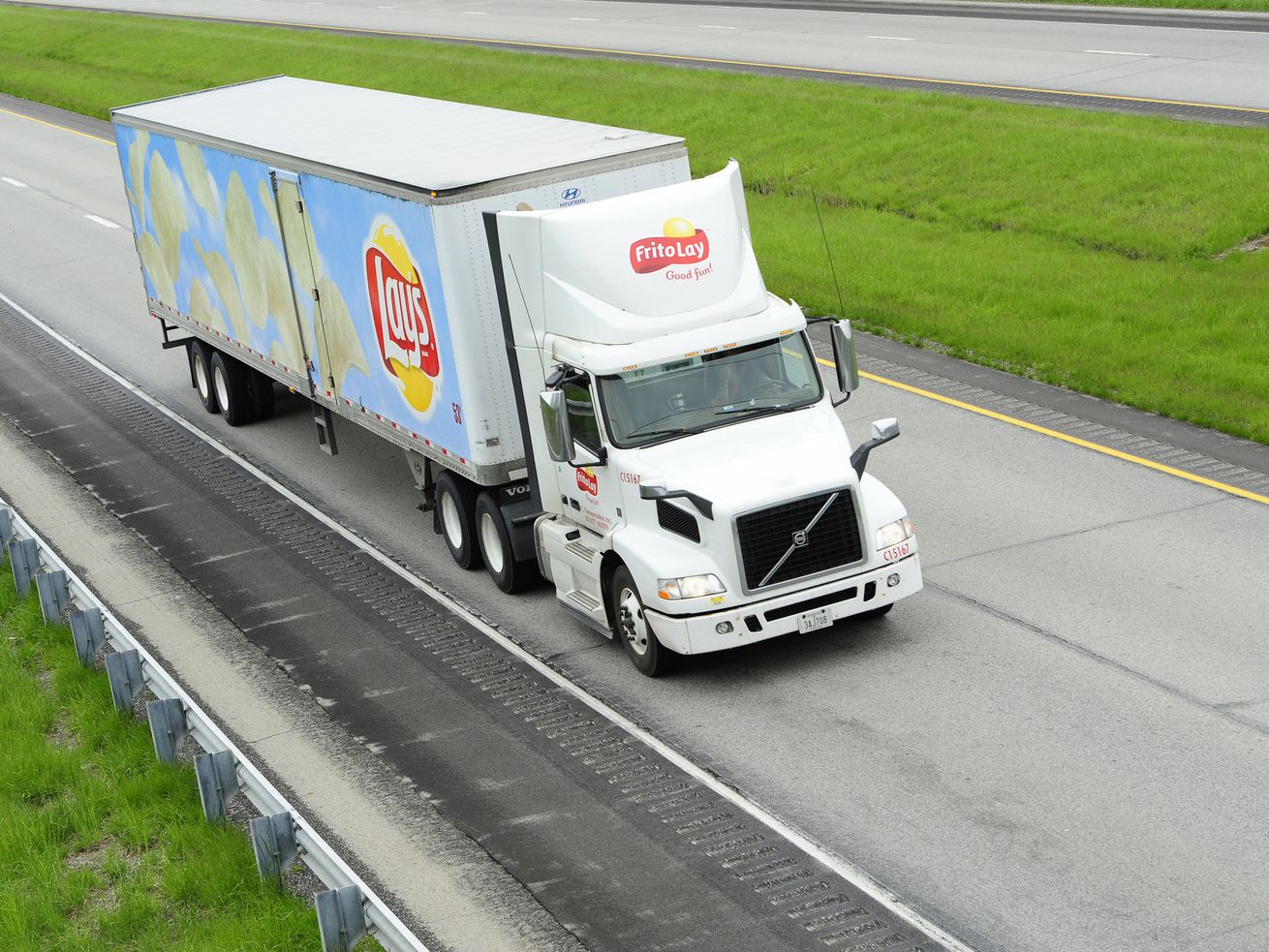Consumers can support workers with their pocketbooks — and politics.
Workers at a Frito-Lay plant in Topeka, Kansas, have been on strike for more than two weeks asking for better working conditions and pay. The way they tell it, they’ve got good reason to take action: Some of the plant’s 850 employees have been subjected to forced overtime and working 84-hour weeks, with no days off. One worker wrote a public letter to the company describing a harrowing scene where a coworker collapsed on the job and died. The people in charge, she wrote, “had us move the body and put in another coworker to keep the line going.”
Frito-Lay says it’s committed to “providing a safe and fair workplace” and has offered a two-year contract it believes addresses workers’ concerns, including capping required work hours at … 60 hours a week. Thus far, the sides haven’t reached an agreement.
The strike has garnered quite a bit of attention in the media and online, as tends to happen with collective worker actions. (See: Amazon workers’ recent failed push to unionize in Alabama, or presidential candidates showing up on Stop & Shop picket lines.) As also tends to happen, there’s discussion among members of the public of how to support the workers. The best way to do that isn’t always clear — social media posts help raise public awareness, but they don’t accomplish much tangibly. The effectiveness of boycotts can vary. And focusing on a single company’s bad actions can muddle the bigger systemic picture.
Mark McCarter, a palletizer and steward at Frito-Lay in Topeka, told Vice that he and his coworkers “would rather nobody buy” any Frito-Lay products as long as the strike lasts, including Fritos, Doritos, Tostitos, Funyuns, and Cheetos. He said they would prefer people avoid products from parent company PepsiCo, too. That’s a bit different from Amazon workers earlier this year, who specifically said they were not calling for a boycott.
In light of all this, I reached out to Kate Bahn, the director of labor market policy and interim chief economist at the Washington Center for Equitable Growth, to discuss what’s going on. We talked about the evolving public conversation around worker rights, what it means for people to be paying attention, and how individuals can best direct their energies if they want to make work fairer and safer. (Hint: The best way to help Frito-Lay workers may not be to stop buying Doritos for two weeks, but instead to support pro-labor politicians and policies.)
Our conversation, lightly edited for length and clarity, is below:
It’s my sense that there’s been more attention to worker rights among the general public lately. Is that right, and is that good?
People are paying more attention. What I sort of see as an inflection point is the #RedforEd movement, [a series of teachers strikes and protests] that began in 2018, which exemplified a new wave of labor movement and a new wave of awareness. There’s research from that period of time that shows that people became more aware because it affected their daily lives. One study looks at parents with children in schools versus parents or children who are slightly younger who are not in schools. It found that parents who were faced with more labor activism became not only more sympathetic to those labor activists in the #RedforEd movement but also expressed more interest in collective action in their own workplaces.
Around Frito-Lay, specifically, there have been questions about whether to boycott its products, or PepsiCo’s, its parent company. Finally, one of the company’s workers came out and said people shouldn’t buy those companies’ products while they’re striking. Should consumers wait for workers on directives like this?
Absolutely. You always follow the workers’ leads. Broadly speaking, boycotts are primarily for raising public awareness versus causing major economic harm to some of these companies. It’s more about fostering solidarity. That’s my perception of where boycotts come from. It’s like a public image campaign, and it puts a lot more pressure on the company if there is broad awareness that they are not doing right by their workers.
That makes sense. And something similar did happen with Amazon workers trying to unionize in Alabama this year, but the ask was sort of the opposite, right? Workers didn’t ask for a boycott, and some people called for it anyway.
Again, that’s where I say, you follow the lead of workers, because I trust the fact that workers are working with union organizers and strategists and people who have a handle on the best way to raise public awareness. In some cases and some products, it may be useful to have a boycott. In some cases, like Amazon, I defer to the fact that [workers] are experts at their jobs and are working with people who are experts on union campaigns. They know more than the regular consumer.
But is the public getting smarter about worker rights overall?
It has continued to evolve. Particularly early in the pandemic, there was some action on workplace safety. It brought to the fore longstanding workplace safety issues. It reached a boiling point, and maybe a point where people were able to be more perceptive because we were all dealing with a public health crisis. There were concerns about the health of people who worked in grocery stores, and people were also afraid to go to grocery stores and understood the threat in the same ways.
We have had 40 years of rising income inequality, and it has just reached a threshold where people are beginning to recognize that a lot of what has caused these broad trends in income inequality and economic inequality, broadly speaking, is a lot of power disparity in the economy. We can’t have an efficient allocation of our resources in a really disparate power structure. Some of the ways to address these huge, long-term economic trends is by rebalancing power. And that is done through things like the labor movement.
Should we be surprised at some of the conditions workers are still facing? Some of the problems the Frito-Lay workers are describing are quite disturbing.
I don’t think so. Again, because of these broad trends, the wide-scale attacks on the labor movement that began in the late 1970s and early 1980s chipped away at the social infrastructure that was needed to protect workers. Effective Occupational Safety and Health Administration (OSHA) enforcement [has been diminished]. There isn’t a high enough density of unions to ensure that workplaces are safe. These are long-term trends.
One could certainly argue that it got worse in the last four years, because some of the tools we had to address some of these big effects of economic inequality and how it affects workers and workplaces were chipped away. There was obviously not a lot of great staffing at the executive level, a lot of intentional diminishing of the federal workforce. And we really need those types of institutions.
The economy does not take care of these sorts of problems. The economic evidence points to the fact that the economy will not just self-regulate to ensure that workplaces are safe. And we need institutions, meaning the government and the labor movement, to rebalance power.
For a lot of consumers, it feels good to be able to do something to at least feel like they can support workers’ movements, whether it means tweeting out a hashtag or boycotting or whatever. But is that really helpful? Like, does me deciding not to buy Doritos for a week make a difference?
It’s good for people to have awareness. Boycotts and social media are tools that do help to raise public awareness. But what needs to happen is policy reform, both changing labor law and improving the functioning of the Department of Labor after four years of being gutted. That is what we actually need to turn the tide against these exploitative forces.
In order to make those policy changes, we do need more public support so people are voting for more pro-labor politicians and are putting pressure on politicians to pass legislation that helps workers. That is what we ultimately need. It’s not going to be one-off boycotts based on whatever worker collective action got more attention in the media, but a step in doing that is raising public awareness.
Can you dig in a little more on what some larger-scale fixes would be here? I think it’s easy to think you did a tweet about the Frito-Lay workers or whatever and feel like you helped.
We feel good when we do these individual actions. But it gives you an excuse to think it is just about Frito-Lay. It’s not. It’s broad trends in economic inequality and outsized corporate power. What we need are things like broad, structural change.
A first step is the Protect the Right to Organize Act (the PRO Act), which is a bill that has been reintroduced on the Hill multiple times that would make it easier for workers to unionize. That’s a first step toward diminishing some of the barriers that we’ve seen toward unionization across the board. Employers are very comfortable with breaking the law and violating workers’ labor rights because there’s very little recourse. So why wouldn’t they do illegal things to prevent unionization if they can get away with it? Or if the fines are very minimal?
It is good to unionize in the old model, but there’s been a restructuring in the economy that means that we need to think expansively toward the future. We have very large companies that have power across the nation. We have a fissured workplace, meaning that, for example, maybe the people who clean at the Frito-Lay factory are not actually employed by Frito-Lay but are employed by a third party. And so if you have joint employer standards, it would mean that if you’re the person cleaning and work for a contractor but at Frito-Lay, then Frito-Lay does have some responsibility for workplace safety even though they’re not your direct employer.
The next step from that would be something like sectoral bargaining. There are proposals that would make it easier to organize and bargain across sectors. Even in the absence of actual collective bargaining agreements, there could be things like worker councils that would help establish workplace safety and job quality standards.
We need those first steps of passing the PRO Act and raising the minimum wage, the broad suite of policies that have been reintroduced year after year and have not gained much ground. And then we need to think about how the economy has changed over the past 50 years, and how we need to reform our institutions and our laws to reflect the current structure of the economy.
If the answers are really policies and enforcement, then what should a normal consumer do? How are you supposed to help?
The old adage that there’s no ethical consumption under capitalism is true. We aren’t going to make broad-scale change through individual consumption choices.
The economic hit that Frito-Lay may experience for the next couple of weeks is not going to make them change their whole business model. If their business model is based on exploitation, that is their bottom line. Diminishing their profit margin for a couple of weeks is not going to make them fundamentally restructure.
People can engage in movement building, like the racial justice movement last summer and going to protests and joining picket lines. They can advocate with policymakers by voting for the policymakers who pass pro-labor reform and holding them accountable, putting pressure on them. And we need both. History has shown us that we need movement building alongside policy reform; you can’t have one or the other.
Author: Emily Stewart
Read More



